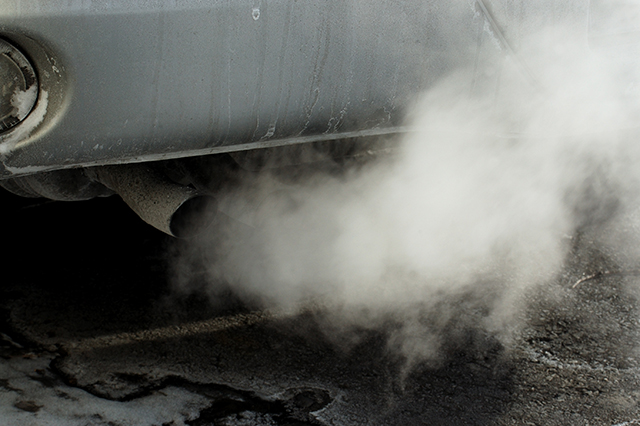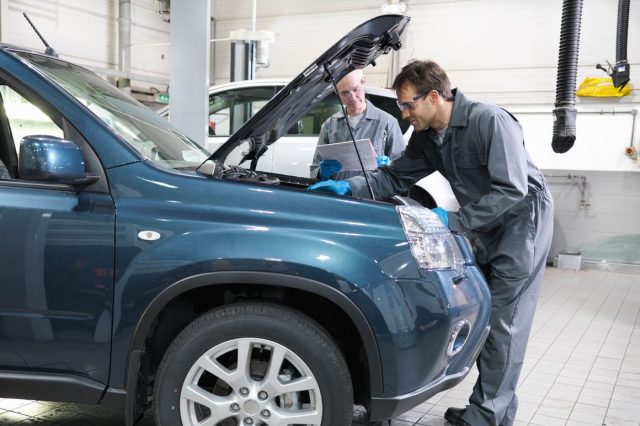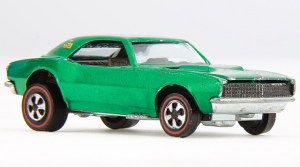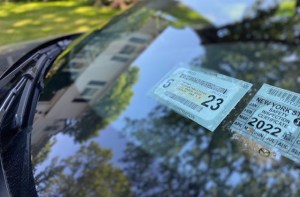We know that we should take our vehicle for regular maintenance. But what if something goes wrong in between your regularly scheduled visits? How do you know when it’s time to see the mechanic?
One way to know if your car needs attention is when the check engine light or other important dashboard lights turn on while driving. Think of these lights like a traffic signal — green, all is fine; yellow, needs attention soon; and red, stop immediately before serious damage happens.
But there are other indicators that something is amiss and readily apparent if you keep your eyes, ears and nose open. Here’s are a few clear signs that your car needs maintenance.
Signs Your Car Battery Is Dying
- Dim headlights: If the engine is off and you turn on the headlights and they are dim, the battery may not have the proper voltage to power lights and other accessories. This could be due to poor connections, a faulty alternator or a battery at the end of its life.
- A bad smell: A leaking battery will expel hydrogen sulfide gas, which smells like rotten eggs. This is caused by an alternator that is overcharging the battery. Over time, the battery will fail.
- Corrosion: One the most common issues with difficulty starting and battery performance is corrosion. This is a blue-green, powdery substance around the battery cables where they connect to the battery.
- Swelling: A battery that is swollen has frozen due to insufficient charging. If your car’s battery is swollen, replace it.
- Clicking sound: This clicking sound when you turn on your ignition is often the result of the starter getting insufficient power from the battery.
- Sluggish crank: A slow-cranking engine could mean your battery is weakening.
AAA will come to you to wherever you are to test and replace your battery if needed. Learn more about AAA Battery Service.
Signs Your Car Needs an Alignment
- Crooked steering wheel/car pulling: If you’re not turning, your steering wheel should sit pretty close to perfectly straight without much effort. If, however, your steering wheel and vehicle pull significantly to the left or right when driving straight it’s a sign your car needs an alignment.
- Abnormal tire wear: Tires should wear evenly across the tread. All four of your tires should also be wearing down evenly. Any inconsistencies could be the result of a misalignment or worn suspension parts.
- Vibrating steering wheel: Tires that are out of balance or wheels that are damaged can cause the steering wheel to shake. A low-speed wobble can be a result of a badly worn tire or bent wheel. A vibration at higher speeds generally is an indication the tires need balancing.

Signs Your Car Needs an Oil Change
- Old oil: Oil lubricates the moving parts of your engine, keeping things running smoothly. Old oil won’t do its job and can cause excessive engine wear and sludge build up in the engine. It is important to check the engine oil periodically, top off as needed and change it as recommended in the vehicle owner’s manual.
- Color and consistency changes: While you are checking your oil levels, take a look at the fluid’s color and texture. The oil should be a translucent, yellowish-brown color. If it’s very dark or thick and gooey, it’s been running through your engine too long and needs to be replaced.
- Exhaust smoke: Some translucent emissions from your exhaust pipe is normal, but smoke is not. This is a clear indicator your car may need repairs.
- Oil Smell: The smell of oil could mean an oil leak.
Should you change your own oil? Find out.
Signs Your Car Is Overheating
- Temperature gauge: A temperature gauge clinging to the “H” end is the clearest sign your car is overheating.
- Steam: If your engine overheats, it could exceed the boiling point of your radiator fluid. This will turn the fluid into vapor, resulting in a cloud of steam emanating from under the hood.
- Reduced engine power: Overheating can cause the engine to slow down and seize up. If you see steam or the “hot” light on, pull over, stop, shut the car off and let it cool.
- Unusual smell: An overheated engine will give off a hot, burning smell and/or a sickly sweet odor. This is the smell of coolant, which will become noticeable if there is a leak. This same sweet smell could also be the result of a leaking heater core, which warms the cabin.
More Signs Your Car Needs Maintenance: Smells and Sounds
- Must, mildew or mold: This smell is the result of a water leak, possibly from the windshield or one of the windows. The water buildup could also be due to one or more of the car’s drains being clogged and not allowing water to drain naturally.
- Burnt toast: This could be a sign of burning insulation, which often happens if there’s an electrical short in your car.
- High-pitched squeal when braking: Worn down brake pads are difficult to notice on your own. Brake wear indicators are designed to make a high-pitched noise and get your attention when the pads are getting too thin.
- Tapping or pinging when accelerating: This one could be as simple as using fuel with a lower octane than recommended. If the sound remains after swapping fuels, it could signify a problem with the engine ignition timing, excessive carbon buildup or a malfunctioning exhaust gas recirculation valve.
- Clunking over bumps: A heavy clunk when you go over rough road surfaces or bumps is a sign your suspension system needs attention.
- Squealing when you turn the wheel: A worn-out or lose power steering belt can cause squealing when you turn the wheel. A growling noise could be a power steering pump that is low on fluid.
If you notice any of these signs your car needs maintenance, find a AAA Approved Auto Repair facility near you. With savings up to $75 per visit on labor, it’s a service that essentially pays for your membership.
For answers to more of your car questions, check out our Ask a Mechanic series.
This article has been updated and republished from a previous version.
9 Thoughts on “Ask a Mechanic: Signs Your Car Needs Maintenance”
Leave A Comment
Comments are subject to moderation and may or may not be published at the editor’s discretion. Only comments that are relevant to the article and add value to the Your AAA community will be considered. Comments may be edited for clarity and length.















Hi,
I do NOT have a check engine light. I have a 2017 Honda accord LX. Some “maintenance minders” have been deemed just a way to make money off of me. I also often go to the AAA in BRICK to have certain things done. Honda keeps INSISTING that I get the PCV valve replaced. Multiple mechanics say that there is nothing wrong with it, and they don’t replace it unless it “fails”.
Every time I go to Honda for an Oil change, the price to replace the PCV valve keeps going up, also. It started at $135, and now they are quoting $200.
What do you know about PCV valves? Is this something you replace just as a part of “maintenance”?
It’s not cheap, or else I would.
Thanks,
Kama Linden
You should try an independent repair shop for routine maintenance. Replacing the PCV valve should cost around $100. As for your check engine light, I believe every vehicle has one. It should illuminate when you start your car & then go out if everything’s good.
I have a 2009 Kia /miles 6,897 the yellow light comes on TEMS. I put air in all of the tries, the car runs good, the alignment is fine. I know the cold weather can effect the tires, I do not have a garage, it is always outside.
The mechanic has looked at it and tells me it is due to the weather because he cannot find anything wrong, it went off for about two day’s and now it is back on again.
My Honda, if I just had the tires rotated, I have to reset the calibration on the car.
Goodyear does not do this.
I learned this is as I was driving to the Jesery shore, days after having the tires rotated.
Another Goodyear yelled at me that “the tires were fine” and my calibration was off.
It just needs to be reset. Mechanics may or may not always do this.
I’m still wondering about changing fluids not just topping off.
Don’t spark plugs need changing at some point? What about fuel injectors?
That’s what I thought was done at a tune up.
Hi Lori, thanks for the question. Here’s an answer from our Car Doctor, John Paul: You are correct — some fluids need changing on a regular basis, but if they can’t be changed due to time, money of other reasons, at least keep everything full. Yes, spark plugs last anywhere from 35,000 to 100,000 miles depending on the vehicle. Other items such as timing belts have specific repair/replace intervals. The best advice is to follow the vehicle owner’s manual. If you have specific questions about your car, just email me (jpaul@aaanortheast) your question with the year make and model and I will try to help.
Very helpful information, thank you
Excellent article and very helpful. Keep up the good work of sending info like this.
Meanwhile, the author of this article did not touch upon what us older drivers recall what a tune-up is. A tune up used to be and perhaps still is an overhaul of the carburetor, spark plugs, wires, distributor cap, etc.
Today’s cars do not have these parts but the spark plugs are still in that engine. When do spark plugs require replacement? I get all different kinds of replies to that question.